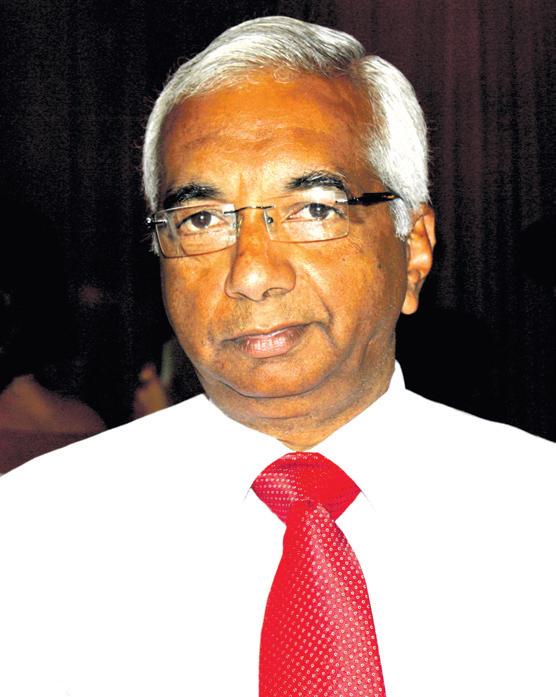
3 minute read
Sustainable roads into the future
from 2012-07 Sydney (2)
by Indian Link
Vijay
(OAM)
For The Use Of Recycled Materials In The Construction Industry
construction industry”, thereby drastically cutting bottom-lines and saving precious resources.
Currently employed with civil and transport infrastructure company Fulton Hogan, Dr Joshi was instrumental in the development and popularisation of slag-based road construction materials.
Steel Mill Services, he conducted extended studies on the plentifully available by-product, which resulted in savings of more than 10 million tonnes of natural material.
Japan, USA, Thailand and more recently, India.
As global consumption spirals out of control putting an enormous strain on existing resources, sustainability and ecological footprints have become the keywords of this century. Over the past decades, innovators have been constantly striving to make more with less.
Prominent Marathi radio personality and community leader Dr Vijay Joshi is among them. The civil engineer has been conferred the Medal of Order of Australia (OAM) in 2012 Queen’s Birthday Honours for his significant contribution to the steel mill industry.
Joshi, who only migrated to Australia in the nineties, has been recognised “for the use of recycled materials in the
A by-product in the manufacture of iron and steel, slag has latent hydraulic properties which enhances durability when combined with concrete or cement, particularly in aggressive environments. Once steel is manufactured, the slag is channelled through a furnace and quickly cooled with water to start the granulation process. It is then filtered in its slurry form through an agitation tank to resemble coarse beach sand.
“I am thrilled and humbled to receive an award for science and technology,” Dr Joshi, who has a PhD on the subject, told Indian Link. “Back in the nineties, nobody thought of using slag for road construction. It was an eye-opener for the RTA as well as numerous local councils”.
As an employee of Australian
“We had over 250,000 tonnes of waste. Thinking outside the box, this particular use of the metallurgical by-product was discovered when I reviewed the specifications of road-making techniques,” he explained.
“More importantly, we also had to prove the material was a quality product and could be used extensively in construction,” added Dr Joshi.
Convincing industry groups was certainly not hard, given the huge cost and resource benefits. Dr Joshi’s biggest breakthrough came in 1994, when slag was used to pave the third runway at Sydney airport.
Since then it has been used on arterial projects including the Kiama bypass and Princess Highway to name a couple. Besides catching on all across Australia, the technology became popular worldwide. Dr Joshi was soon invited to collaborate with a number of countries including
Dr Joshi received a hero’s welcome in his hometown Thane in Maharashtra state recently, where a huge felicitation ceremony was organised.
While he has already been working closely with Indian officials to share the knowhow, particularly in steel heartlands of Jamshedpur and Jharkhand, more technocrats are taking him seriously this time round. India, Dr Joshi feels is a huge market waiting to be tapped. With steel production in excess of 200 million tonnes, there is tremendous scope.
“For the past five years, I have been advising various Indian institutions on the use of slag,” he stated. Following an interview on a major Indian TV channel in 2006, Dr Joshi was sought out by Tata Steel.
“While the project has not materialised yet, the process has already been set in motion,” revealed Dr Joshi.
The civil engineer diversified into petrochemicals during a stint in the Middle East, and later into roads and infrastructure while living in New Zealand, while working for the National Roads Board.
The Wattle Grove resident has been extremely active in the community as well, founding popular radio show Akashwani Sydney along with Dr Sawrikar nearly fifteen years ago. As a show host, he has been promoting greater community participation in mainstream lifestyle events such as City to Surf.
“I always make it a point to walk with participants, motivating those who are new to the event and I am delighted to say that each year at least 50-60 listeners take part,” he added.
He has also been the backbone of the community’s cultural efforts, painstakingly coordinating the behind-the-scenes efforts of many programmes.
Dr Joshi is very active in the Hindu circle as well, spearheading many projects at SVT Helensburgh. As his personal gesture of thanks to the community, the roads within the sprawling complex were paved at minimal cost using his own slag technology.
Usha Ramanujam Arvind









